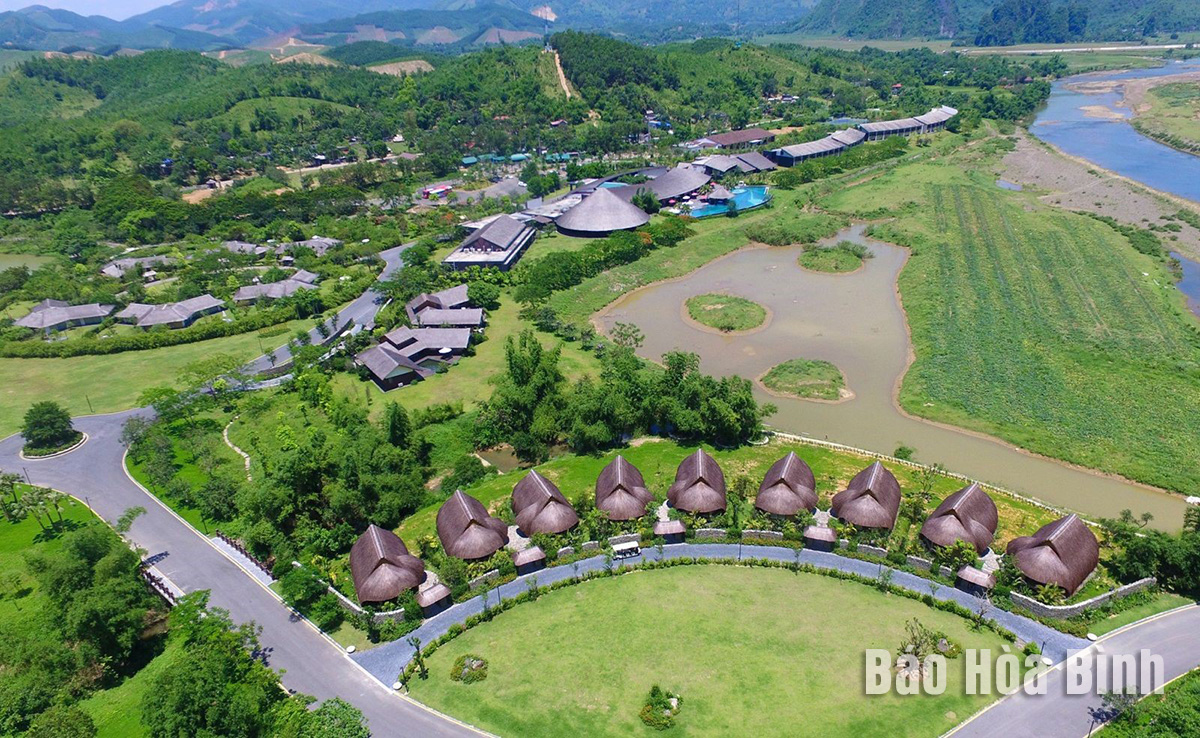
Kim Boi district, Hoa Binh province, has completed its regional planning until 2040, and worked on the construction planning for 14 communes, three zoning planning, and nine detail planning for rural residential areas, according to Tran Tuan Son, Vice Chairman of the district People’s Committee.
Son said that the locality has actively designed 25 other planning to lay the foundation for the management of construction activities and the attraction of investment capital, thus promoting the local socio-economic development and mobilising resources for the district’s long-term growth.
Serena Resort Sao Bay has been an outstanding tourist site in Kim Boi.
Under the district planning, Kim Boi is divided into three regions. Region 1 comprises five communes of Binh Son, Du Sang, Tu Son, Vinh Tien, and Dong Bac, focusing on developing resort tourism, cultural tourism, and industrial clusters with a total area of 14,155 hectares.
Region 2 consists of Bo townships and Vinh Dong, Kim Boi, Hop Tien, Xuan Thuy, Hung Son and Kim Lap communes, aiming to boost urban development, resort tourism and health care services associated with hot mineral water resource exploitation, which has a total area of about 26,981 hectares. Bo township will be developed into a four-tier urban area.
Meanwhile, Region 3 gathers five communes of Nam Thuong, Sao Bay, Cuoi Ha, Nuong Dam and My Hoa, focusing on developing high-tech agriculture, resort tourism, and eco-tourism, with an area of about 13,972 hectares.
Currently, a 16.31-km section of the Hoa Binh-Ha Noi road and Son La expressway connecting Hoa Binh and neighbouring Son La province crossing Kim Boi have been built, helping optimise the mineral water resources of Kim Boi and creating a development space for the district.
In order to promote its advantages, Kim Boi is calling for businesses to invest in eight hot mineral water spots. As of April, the district had attracted many projects, including Venus Resort that covers nearly four hectares in Coc village of Vinh Dong commune, the cultural tourism and resort complex in Cuoi Ha commune and Kim Boi commune, and Apec Mandala Sky Villas Kim Boi in Mo Da village of Bo township.
The district currently has 46 tourist accommodation establishments, including three resorts, two hotels, 41 motels with a total of 798 rooms and 1,077 beds. In the first quarter of 2024, Kim Boi district welcomed 15,080 tourists, earning 22 billion VND (866,569 USD).
Along with tourism development, the district has focused on expanding the "One Commune-One Product” (OCOP) programme. After six years of implementing, the district has developed 12 OCOP products, including two four-star products.
Nguyen Minh Anh, Vice Director of the district Agriculture and Rural Development Division said that the project to bring OCOP products into tourism activities has been actively responded by locals, helping promote the value of the products. She advised communes and townships in the district to make planning on concentrated production regions for OCOP products, while building OCOP introduction and selling booths that are easy for tourists to find.
Kim Boi is also creating open mechanisms and providing best conditions for investors in the locality in a bid to optimise its potential and strengths.
Playing a key role in Hoa Binh province’s economic development, Luong Son district has been focusing on science and technology development, innovation, and digital transformation.
Identifying the application of online public services as a key step in administrative procedure reform and e-government building, Kim Boi district has proactively provided services and supported residents and businesses in accessing and utilising full-process online public services promptly and efficiently. The locality aims to lift the rate of end-to-end online public services to over 90%, with all officials and civil servants handling tasks in the digital environment.
Nguyen Anh Tuyet, hailing from a family steeped in the ancient art of herbal medicine, is transforming local medicinal herbs into high-value concentrated extracts, elevating their worth and healing potential.
Nguyen Phi Long, an alternate member of the Party Central Committee, Secretary of the Hoa Binh provincial Party Committee, and head of the steering committee for the province's key projects, chaired a conference on March 25 to discuss measures for implementing the project on constructing the Hoa Lac - Hoa Binh road and upgrading the Xuan Mai - Hoa Binh section of National Highway 6 under the public-private partnership (PPP) model.
Administrative reform has been identified as a key priority in enhancing state governance, improving the business environment, and facilitating services for citizens and enterprises.
The Standing Board of the Hoa Binh provincial Party Committee met on March 18 to review and guide major investment projects aimed at boosting local socio-economic development.



